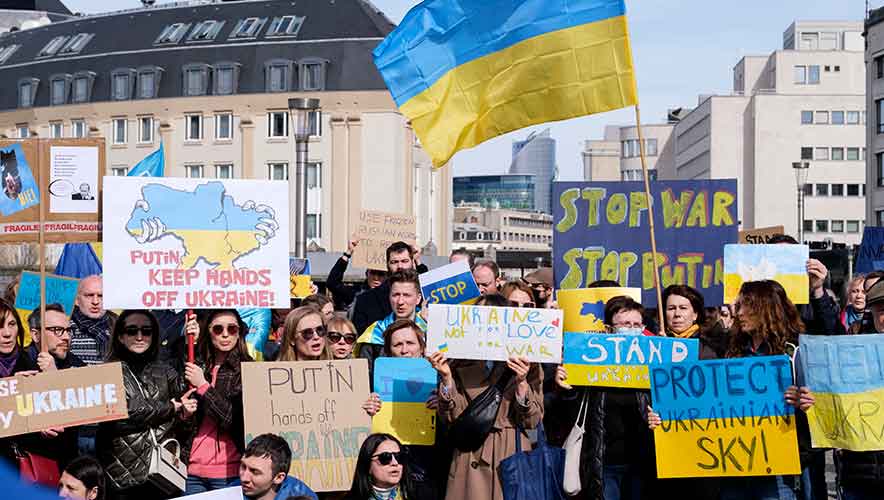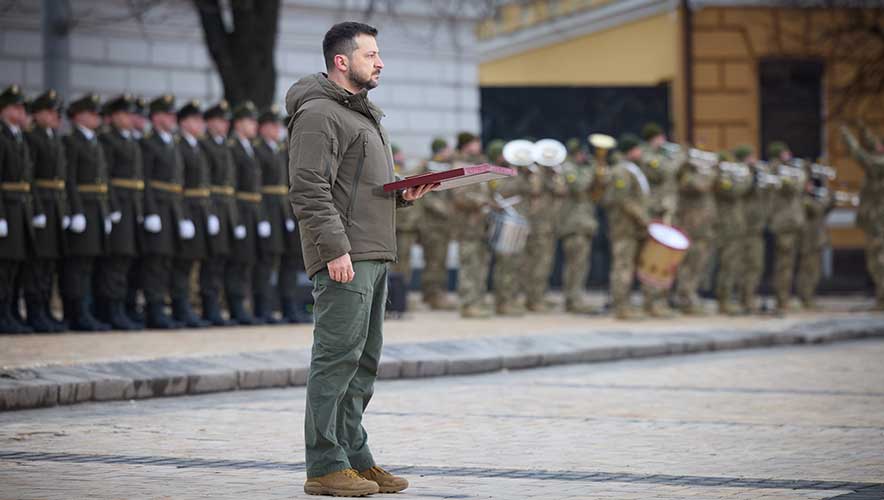One Year Later: Ukrainian Security Practitioners Reflect on Invasion Anniversary
“How are you?”
It’s a simple question posed to Mykola Mikheiev after signing on to our evening Zoom call. He is the ASIS Ukraine chapter chair; a CPP, PCI, PSP; a veteran; a former diplomat; a security operation center officer for the European Union Advisory Mission of Ukraine; and an owner of a security consultancy business.
But the answer is a complicated one for Mikheiev, who continues to work and live in Kyiv, Ukraine, alongside his wife and an ongoing war that’s transformed their country.
“I’m engaged, I’m speaking abroad, yet somehow… I feel guilty that I’m in the capital,” he says. “I have a job, and I’m doing what I can with an international organization, but I somehow feel I should be on the front lines. I was deployed before in 2019 and saw war in reality. But when the war started in my home country, it was an absolutely different situation, and it’s probably because I’m worried about friends and loved ones. It’s different than being neutral or an impartial observer in Iraq and Afghanistan.”
After Russia invaded Ukraine on 24 February 2022, millions of people left the country via car, train, and bus. But millions of others stayed.
Ahead of the one-year anniversary of the invasion, Security Management spoke with Mikheiev and Tatyana Andrianova—two Ukrainians who have remained in the country and continued in their security careers—about how the war has impacted their lives and changed the work that they do.
“All my past experiences helped me prepare for this situation,” Mikheiev says. “After the first shock, I realized that this war would be a long period—it will not stop in 10 days. I realized my previous life had trained me for this. But I didn’t realize that training would apply to my home country.”
Risk Reevaluated
The ASIS Ukraine Chapter was founded in 2018 under the leadership of Viktor Panchak, CPP. Mikheiev then took the helm after their chapter elections in November 2021. At the time, many organizations and people did not believe that Russia would invade Ukraine. But in chapter meetings that winter, Mikheiev says they began promoting developing emergency and evacuation plans to help members prepare.
Those preparations came into play on 24 February 2022 when Russia invaded Ukraine, and Mikheiev drew on his experience as a security officer and former diplomatic protection team leader in Kabul, Afghanistan. He helped evacuate his office—part of a mass exodus of people leaving for the western border of Ukraine—before returning home.
“And then life totally changed,” he says, explaining how people struggled to get food because supply chains were impacted by the invasion. There were also explosions as fighting began in the suburbs of Kyiv. “There were security checkpoints, and the city became very dark at night. We realized how it was easy to take the modern advantages of life from man,” Mikheiev adds.
His perception of risk has also changed during the war, becoming more tangible and impacting not just business decisions but personal life choices, too.
“It became a very real concept because people were starting to understand risk through daily operations and daily life,” Mikheiev explains. Missile attacks were frequent, but beginning in autumn (the third quarter of 2022) missile attacks targeting civilian infrastructure became more prevalent.
“You’d hear sirens, and because the Russian weapons were unpredictable they might hit any building in the capital,” he says. “You need to evaluate risk personally. Are you going to a shelter? Do you need to deliver support for volunteers? This risk became everyday reality for Ukraine.”

Life and risk evaluation has also changed for Andrianova, head of corporate security for Octava Holding—a large Ukrainian group that specializes in asset protection. Her husband went to the front lines of the war shortly after the invasion, her 15-year-old son and 6-year-old daughter went to live with her sister elsewhere in Europe, while she continues to live and work in Kyiv.
Ahead of the war, her company had developed standards, policies, and guidelines to protect assets form external and internal threats.
“But we could not even assume that in our peaceful country in the 21st Century, we would face such a threat as war,” Andrianova says. “Everything has changed radically. After a year of the war, businesses must operate under tough conditions. Mass shelling, constant air raids, power and communication blackouts, lack of centralized water and heating, legislative restrictions, low paying capacity of customers, mobilization of qualified personnel, and emotional burnout of employees. We have to quickly adapt to all these new phenomena and, in fact, build a new risk map, scenario planning, and a new system of corporate security in general.”
Another key area of business risk that changed after the invasion was cyber risk. The number of cyberattacks against Ukrainian infrastructure and businesses increased during the past year, according to assessments based on anecdotes and major reviews from cybersecurity firms released earlier this year.
These attacks include a “fairly large proportion of DDoS attacks, which only block the work of services for a while,” Adrianova says. “But there are attacks aimed both at stealing databases—mostly from government agencies—and at destroying information systems. Moreover, we can see that attacks are coming not only against the state sector, but in general against everyone they can reach—even those that were not of much interest before, including small businesses.”
Management Changes
In a crisis where people are experiencing trauma, having a job with a paycheck provides an important form of stability. So, too, is having a work team where someone can offer clear guidance about what the plan of action is, Mikheiev says.
“When a crisis happens, people behave differently depending on their culture, experience, and their experience with trauma. You need to accept that they will behave differently,” he adds. “People need support, assurance, and guidance. They’re looking for someone who is ready to stand up, take charge, and give them a clear path of what we’ll do together. Then people will follow you. I learned it through the military, and deployments to Iraq and Afghanistan.”
After the invasion, it was extremely important to communicate with employees that their families—and their families’ safety—were a priority. Demonstrating this means that people will be more committed to their work and supporting their colleagues and community.
“Give them time to help their loved ones first, and they will return to the office to invest their skills to help the community,” Mikheiev adds.
It’s also important to understand the challenges of continuing to manage a team of people under wartime conditions, especially women who may be living abroad with their children, men who may be mobilized and sent to the front lines, and people who remain in the office with difficult psychological pressures, Andrianova says.
“We are adapting to work in new conditions,” she adds. “Corporate psychologists are constantly working with people, tools are being introduced to maintain team morale, material and psychological support is being provided to mobilized employees, and regular meetings are being held with people in a hybrid online/offline format. We want to make sure we don’t lose touch with the team, keep people believing in our bright future, and preserve our corporate values.”
The ASIS Ukraine Chapter is also working to preserve those connections between members, including some who have been mobilized to serve in the military. Mikheiev says the chapter has held regular virtual meetings during the past year—including one two weeks after the invasion that 37 members joined to just speak and share their experience. The chapter also worked to have a delegation sponsored to attend ASIS Europe 2022 to speak about the war, to garner support from the ASIS Foundation via grants to provide aid to members who lost their homes during the conflict, and to be selected to receive a CPP Starter Kit in 2022 to provide resources for members wanting to achieve professional certifications.

That work has resulted in growth of the Ukraine Chapter—up to 103 members from the original 80—that is committed to professionalizing the private security industry in Ukraine alongside partner organization, the Association of Corporate Security Professionals of Ukraine, Andrianova explains.
“The outbreak of the war in our country has further strengthened our cohesion and unity through the exchange of experience and knowledge, mutual support in times of crisis, constant communication, and the collective solution of our common tasks and goals,” she says.
Looking Forward
As the anniversary of the Russian invasion and the end of winter neared, analysts and security experts predicted that Russia would begin a new offensive against Ukraine—with increased aerial strikes and deployment of reserves.
“However, this is unlikely to significantly expand in scope as Russia simply doesn’t have the resources to do so currently,” says Julian Moro, senior vice president of security solutions at International SOS. “Because Russia is unlikely to risk further undercutting its campaign by launching a renewed offensive from the north, we expect to see fighting remain focused in the east and south in the coming months, in addition to continued aerial strikes across Ukraine, primarily targeting critical infrastructure.”
Ukraine will also likely launch a renewed counteroffensive, focused on Zaporizhzhya and expanding east to break supply and communication lines between Russian troops in eastern Ukraine and Crimea. With these expectations in mind, Moro says secure ground transportation, accommodations, and communication considerations should remain top of mind since there may be increased requests for those not able to evacuate affected areas.
“During this time, ongoing education and accessibility is key for employers looking to protect employees,” Moro adds, recommending that organizations consistently revisit the likelihood and possible impact of security risks to understand potential implications for their business and people. “Managing crisis management fatigue is key as the conflict continues to intensify in the coming weeks.”
The crisis is also changing because after a year where millions of people evacuated the country or relocated out of a conflict zone, many people are looking to return to Ukraine. This is forcing companies to reassess their resilience and crisis management practices to provide support and protection for these individuals.
“Many of our clients, across all sectors, from NGOs to professional services, have national and international employees returning to Ukraine, and they have been seeking really detailed, granular information regarding the security situation, our outlook, and also to understand the depth and extent of in-country security and medical security capabilities,” Moro says.
This may prove difficult in part because Russia’s next steps in the war could be unpredictable, Andrianova says.
“We understand that we are dealing with a nuclear-armed state, and we do not rule out the use of the entire arsenal at their disposal in order to achieve their goal,” she adds. “We also do not rule out another attempt by the Russian Federation to launch a full-scale invasion, which could lead to even more employee turnover, business relocations, productivity loss, and employee burnout. We are now living and doing business in a short-term planning mode, so the task for today is to preserve what we have, resist the enemy, and protect the independence and integrity of our democratic state.”
Winning this war will make Europe safer, Mikheiev says, and he is committed to working with international colleagues to rebuild Ukraine when the conflict is over. In the meantime, it’s important to not lose sight of one’s own needs to remain resilient—tactics he learned during his military training that were reinforced by books he recently read by Viktor Frankl, a psychologist and Holocaust survivor.
“Try to sleep well. Exercise. Have mercy for yourself. Sometimes you can have a weak point, but use your courage and look after yourself,” Mikheiev says. “You need to do simple things that will get you through the conflict, so look after yourself.”
At least 8,000 civilians have been confirmed killed and nearly 13,300 injured since Russia invaded Ukraine on 24 February 2022. Fourteen million people have been displaced from their homes, and nearly 18 million people are in dire need of humanitarian assistance due to the conflict, according to the United Nations. For more information and security analysis on the one-year anniversary of the Russian invasion of Ukraine, check out “A Year of War;” “Ukrainians Reflect on a Year of Loss, Resilience, and Fear;” “The Front Line;” “Narrative Warfare;” and “Fog of War.”
Megan Gates is senior editor at Security Management. Connect with her at [email protected] or on LinkedIn. Follow her on Twitter: @mgngates.
Claire Meyer is managing editor at Security Management and also contributed to this report. Connect with her at [email protected] or on LinkedIn.










